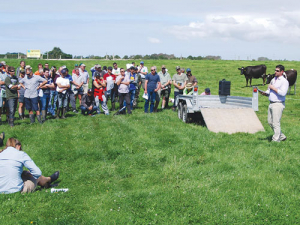Wired for Science: Understanding the feeding habits of mealybug
Fussy children might be frustrating, but fussy mealybugs could help protect the New Zealand wine industry from grapevine leafroll-associated virus 3.
 IrrigationNZ project manager Steve Breneger (right) addresses the Lincoln Uni Demonstration Dairy Farm open day.
IrrigationNZ project manager Steve Breneger (right) addresses the Lincoln Uni Demonstration Dairy Farm open day.
Dairy farmers are being warned to keep a lookout for a common virus which may be becoming more virulent in New Zealand herds.
A continuing high herd empty rate is puzzling the Lincoln University Demonstration Dairy Farm, and some suspicion is turning onto IBR (Infectious Bovine Rhinotracheitis).
Manager Peter Hancox told a gathering of 300 at the farm’s February 23 focus day that the empty rate was 9% this spring, versus 14% last year.
“It’s an improvement but it’s still not where we want to be. We’re struggling to know why.”
Donald Arthur, of Selwyn Rakaia Vet Services, told the open day the disease struck the LUDF herd in the first week of November, when several two-year-old milking heifers presented with very high temperatures, mild coughs and discharges, the worst affected being “right off their milk”.
“We believe it was going through the herd about the time we were trying to get the cows pregnant. Particularly it seemed to be affecting the two year olds.”
However, the possible link was not clear, some of the empty cows having tested positive for IBR and others negative.
IBR is a type of herpes virus, common in NZ although local strains usually appear mild compared with overseas, where abortions and encephalitis due to IBR have been recorded.
Arthur says it is generally quite innocuous.
“But we are starting to see episodes like those we’ve seen at Lincoln.
I don’t know whether more pathogenic strains are emerging or whether they’ve always been out there and we’re recognising them.”
Arthur says that as a virus there is no treatment for the primary disease but plain white penicillin is useful against secondary bacterial infections.
Vaccination rates had been higher 20 years ago but had fallen, in part because animals testing positive for IBR could not be considered for the China export market.
“It’s something to be aware of, something that could affect herd performance, and it could even impact young stock growth as well if they get it bad enough.”
The LUDF herd is now vaccinated against IBR but Arthur is reluctant to suggest all farmers should vaccinate.
“Watch this space; if we are seeing the emergence of more pathogenic strains maybe we will have to consider it,” he says.
Expect greater collaboration between Massey University’s school of Agriculture and Environment and Ireland’s leading agriculture university, the University College of Dublin (UCD), in the future.
A partnership between Torere Macadamias Ltd and the Riddet Institute aims to unlock value from macadamia nuts while growing the next generation of Māori agribusiness researchers.
A new partnership between Dairy Women’s Network (DWN) and NZAgbiz aims to make evidence-based calf rearing practices accessible to all farm teams.
Despite some trying circumstances recently, the cherry season looks set to emerge on top of things.
Changed logos on shirts otherwise it will be business as usual when Fonterra’s consumer and related businesses are expected to change hands next month.
Reflecting on the past year, Horticulture New Zealand chief executive Kate Scott says there has been a lot to celebrate.